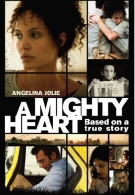The kidnapping and murder in early 2002 of Wall Street Journal reporter Daniel Pearl by extremist Muslim terrorists in Pakistan was a horrific and shocking event. It stood out, even in the shadow of 9/11, due to pictures and videos released on the Internet showing Pearl’s body being decapitated by his captors. The impact of Pearl’s kidnapping on his wife, family, friends, and co-workers is portrayed in A Mighty Heart not as the expected political diatribe or melodrama, but as a tense quasi-documentary of real emotional pain and resilience. Angelina Jolie portrays Pearl’s Dutch/Cuban wife, Mariane, who wrote the book that John Orloff adapts into a taught no-frills script and is the focus of the narrative. Daniel (Dan Futterman) is shown on January 23, 2002 heading towards a meeting in Karachi with a Pakistani sheik who reportedly had contact with terrorist shoe bomber Richard Reid and never returns. Mariane is at the home of one of Daniel’s Wall Street Journal colleagues, Asra (Achie Panjabi, who played the older sister, Pinky, in Bend it Like Beckham,) and the two women quickly call in the Pakistani police, headed by Captain (Irrfan Kahn), and the American consulate security chief, Randall Bennett (Will Patton.)
After his brief appearance at the beginning, Daniel only shows up in Mariane’s memories and one videotape sent from his kidnappers. This is Mariane’s show and Jolie nails her combination of relentless hopefulness and increasing despair as the weeks roll on and Daniel is not found. There are few outbursts from Mariane who is told by a, at times, kinda creepy Bennett that she can’t collapse. “Everyone else can collapse,” he says, “but you can’t collapse.” So the hand-held cameras capture Mariane as the moral strength in Asra’s increasingly crowded house as it becomes the command center in the search for Daniel.
Director Michael Winterbottom also takes his cameras to the streets of Pakistan, showing that looking for Pearl is literally a needle in a teeming haystack exercise. Kahn is brilliant as Captain, who uses leads provided by Mariane and Asra, along with other police methods, to track down several of the kidnappers. Winterbottom doesn’t harp on the political aspects of the case, other than a few references to the treatment of Guantanamo prisoners, instead shining his natural lighting on the people who worked tirelessly with Mariane for a month in order to find Daniel.
Jolie uses an accent often described as French/Cuban, although it sounds mostly French and due to the use of improvised overlapping dialogue sometimes makes her hard to understand. In fact, everything that pushes the movie away from melodrama and towards documentary makes it harder to tell what is going on. The Pakistani characters speak either heavily accented English or in subtitled Urdu and are as hard to follow as Jolie. The plot is not presented in a straight-forward way, instead Winterbottom gives us the same bits and pieces in random order that Mariane received. In fact, Asra keeps track of everything on a large white board and at the end the lines and connections still make almost no sense, emphasizing the waste of Pearl’s murder.
Pearl’s beheading, thankfully, is not shown but this isn’t an easy movie to watch. The filmmakers put you right in the center of a difficult and confusing place during a crisis and let you make sense of it as the characters do the same. It’s a well done effort that will not appeal to all but stands apart from the typical Middle East message picture we are seeing these days. The disc does not have much in the way of extras and in keeping with the gravity of the subject, most of them are like broccoli, things that are good for us. The transfer is very good, although in the film itself Winterbottom added small identifiers as new characters arrive or the scene shifts. These are written in white in a very small, difficult to read font. It’s possible these were clearer on the big screen, but on the disc it is often hard to tell who the new character is or where the action is taking place.
The biggest extra is a 30 minute making-of documentary. About two-thirds of the documentary covers the main characters (Daniel, Mariane, Asra, Captain, Bennett.) The actors and others talk about the real-life people and what they are trying to accomplish on screen. It’s interesting, but watching the movie gives you the same sense of the people that they talk about in the documentary.
Much more interesting but not given as much time is the actual filming process. The documentary look and feel is discussed by Winterbottom and some of the actors. The majority of the film was shot in about five weeks in a house in India, standing in for Asra’s house in Pakistan. Winterbottom talks about shooting in sequence so that by the end of the five week shoot, the characters have a similar relationship to the one being projected onscreen.
Your Daily Blend of Entertainment News
That is the only “movie-focused” extra on the disc. There is no commentary or deleted scenes. A commentary by Winterbottom would have been interesting. Jolie probably would have talked about how great Mariane is, something she does extensively in the documentary, and because that’s so obvious anyway, there is really nothing lost by her not doing one, but the filming process would have been nice to hear about more detail.
There is an eight minute featurette on the Committee to Protect Journalists (CPJ). This was made specifically for the disc and includes scenes from the film, but the main point is to talk about the work of the Committee. Two of the executive directors explain the history and purpose of the CPJ and bring the risk related to being a journalist in a war zone up to date. The CPJ doesn’t really have much influence in situations like Pearl’s as they typically try to influence government’s to not crack down on journalists, but it is not a work that most are familiar with, so it does spread the word a bit.
The final extra is a quick PSA from journalist Christiane Amanpour about the Daniel Pearl Foundation, started by Pearl’s parents. Amanpour talks about protecting journalists but it isn’t clear how the Foundation helps in that area. Regardless, it’s about a minute long.
The disc doesn’t enhance the movie much, and that’s a shame. However, the material in the film doesn’t lend itself to Lord of the Rings type extras, so there isn’t a whole lot more the producers could have done. Like the movie itself, the disc is understated and restrained. The focus is mostly on the movie, as it should be.

